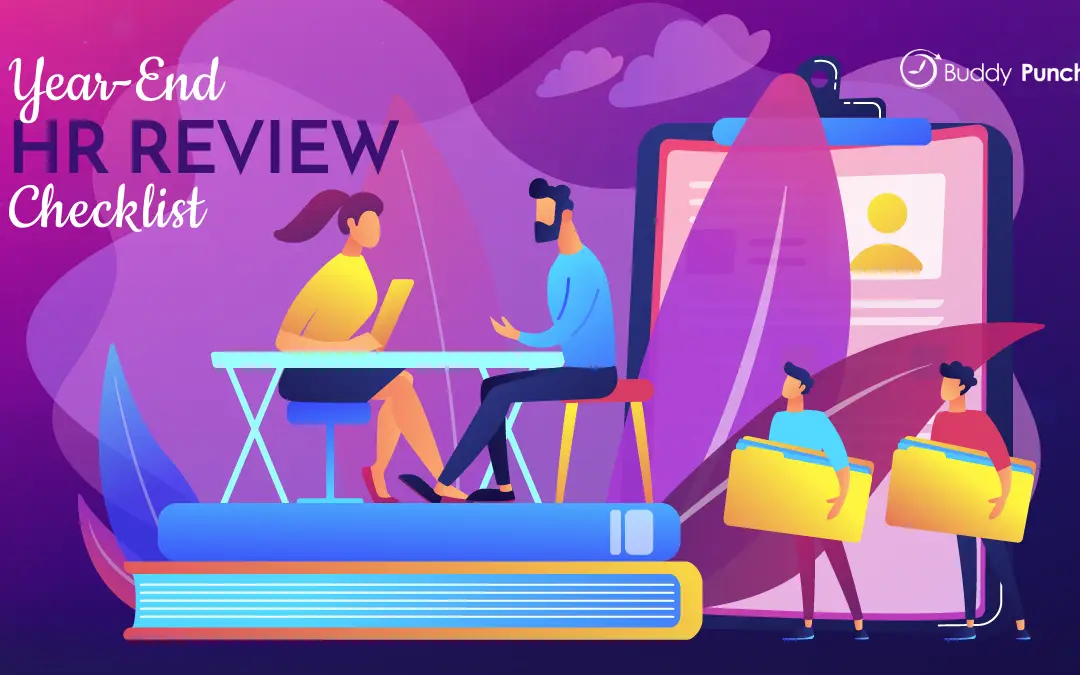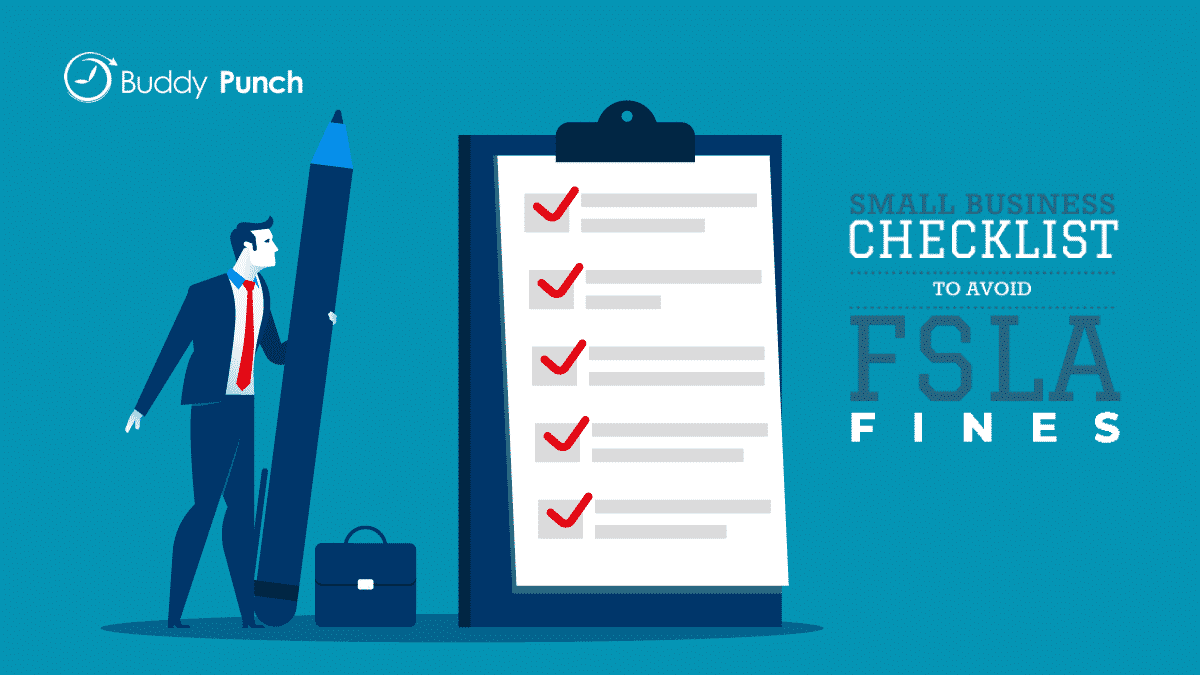Year-End HR Review Checklist

With the new year fast approaching and new employment laws, now is the perfect time for small businesses to take on cleanup of all employee files in the human resources department and make sure that your business is compliant. It is imperative to keep your personnel files up to date, not only to ensure they are receiving the correct benefits but to also avoid any potential penalties for not complying with state and federal regulations. We have put together a year-end HR checklist of the most critical areas to focus on to help you get started.
1. Employee Files
Employee information is ever changing and needs to be updated at least annually. Ensuring that employee information is up to date can keep you from incurring potential fines and even legal action. Take the time to reach out to your employees and make sure all of their information is accurate and recent.
So what exactly are the most important pieces of information to update?
- Job Descriptions – Document the initial job description for each employee and be sure to update this information if their roles and responsibilities have changed. You may find that benefits have changed based on their new role and responsibilities. You can then adjust other important details for the employee such as the amount of PTO earned.
. - Correct Personal Information – Remind employees to keep their personal information updated such as their addresses, phone number, social security numbers, tax withholdings and so on. Making sure their personal information is updated frequently can save you from having to make unnecessary adjustments to documents later on.
. - Review Information – It is important to document the schedule and compensation scale for employee review. Also ensure you keep previous performance reviews, disciplinary documentation, and promotion and pay history up to date. In the event you need to reference any of this information, you will have peace of mind that it is all complete and accurate.
2. HR Cleanup
The new year is the perfect time to clean up and get organized. While the new year can be a bit hectic as most companies have little time to ensure everything is up to date and accurate, the following general HR cleanup tips can help you get organized quickly and efficiently.
- Record Retention – If your business does not have a retention policy in place for maintaining paperwork, then this would be a great time to create one. If you already have a policy in place, then make sure it is up to date to reflect current federal, state, and local regulations.
. - Forms – It is important to ensure that all employee pertinent forms are completed and filed for every active employee – such as I-9s, FICA, and FUTA forms. Check with the IRS, as the due date on some of these forms varies, as do the forms themselves. For example, The FFCRA Tax Credit allows employers to be refunded for sick pay for employees impacted by coronavirus. As for your terminated employees and their I-9’s, these need to be kept on file for three years from the date of hire or for one year from the date of separation, whichever is longer. These terminated employee I-9’s should be kept separate from the active ones and labeled with a retention date. Purge any I-9’s that are past their retention date and send them to the shredder!
. - File Access – Just as it is important to keep files up to date, it is also important to keep track of who has access to confidential and personal information. Be sure to review who has access to employee records to protect their confidentiality.
. - Recruiting and Hiring – You should keep resumes and applications for a minimum of one year along with any materials from the hiring process such as questionnaires. If you find that any items have reached their retention period, then be sure to shred those to help keep your staffing of new hires seamless. You should also take the time to review your current onboarding materials as well as any employee benefit documents to ensure they are still applicable to your business, your culture, and the candidates you are looking to hire.
3. Evaluate HR Compliance
As your business grows, it is crucial to keep up to date with laws and regulations. Failing to comply with HR laws could cost you dearly and may even lead to state and federal penalties. Here are just a few of the important items to review to remain compliant with HR laws and procedures.
- ACA Compliance – Make sure your business’s health insurance policy and forms conform to the regulations of the Affordable Care Act (AKA Obamacare). This includes determining if you’re an Applicable Large Employer (ALE) with an average of 50 or more full-time employees (FTs) or full-time-equivalent employees (FTEs) over the year. If so, you’ll have to look into handling distribution and submission of Form 1095-C and Form 1094-C to the IRS prior to deadline.
- FMLA Compliance – The Family Medical Leave Act (FMLA) has strict requirements for who’s subject to the law (covered employers), and many HR professionals struggle with determining eligibility and managing notice requirements. Calculations for the leave year must be completed by the end of the year in order to determine the scope of time off and paid time for your employees in the following calendar year.
- Labor Law Posters – There are several federal, state, and local laws on workplace postings which can be found on the U.S. Department of Labor website. Be sure to keep a calendar of expiration dates for these notices so you can keep compliant and avoid any potential fines.
. - Workplace Harassment – You should have an annual review scheduled with your team to educate them and reinforce any potential issues. This is also a good time to speak with any employee one on one who may wish to report any workplace abuse or mistreatment.
. - OSHA Training – To maintain compliance with the Occupational Safety and Health Administration, you should provide annual team training. Take this time to make sure all training documentation is up to date and reflects current OSHA training regulations.
. - HIPAA Compliance – If your business has access to Protected Health Information, then it is important to ensure your organization complies with HIPAA regulations to secure confidential patient data.
. - Safety & Security Review – The workplace should be a safe environment, and clear steps should be outlined in the event of an incident. Review your current reporting processes and update as necessary to make them clear and concise for your employees.
4. Policies & Practices
- Employee Handbook – Employee handbooks should be reviewed and updated at least once per year. All company policies, procedures, as well as your company mission should be detailed in the employee handbook. Make sure that all company policies reflect current laws.
. - Succession Plan – In certain workplaces, especially small businesses, it can be helpful to identify potential new leaders who can step into a management rule in the event of any management turnover.
. - Payroll – Review your company’s current pay schedule and review any paperwork deadlines, such as the filing date for W2’s, which is January 31st! It would also be a good idea to ensure that all employee PTO is being calculated and applied correctly. An audit of payroll would be beneficial to guarantee benefits and deductions match up with invoices.
. - Open Enrollment Periods – Be sure to give your team sufficient notice of the periods for healthcare enrollment. Take the time time to review current plans and their cost to determine if they fit your business.
. - Salary Review – It is important that your salary compensation keeps up with the market. Use this time to review your company-wide salaries to guarantee they reflect current salary rates.
Doing an HR review annually is imperative to ensure your business keeps running smoothly and efficiently. By making an effort to purge and evaluate your current policies, processes, and procedures, you will save time in the long run, and allow for an efficiently running business. Along with our checklist, there are plenty of resources available to help guide you through the HR review process.
Disclaimer
The materials available at this web site are for informational purposes only and not for the purpose of providing legal advice. You should contact your attorney to obtain advice with respect to any particular issue or problem. Use of and access to this website or any of the e-mail links contained within the site does not create an attorney-client relationship between us and the user or browser.
Recent Posts



